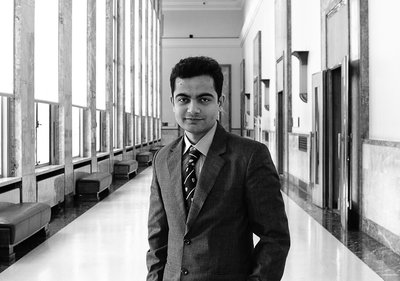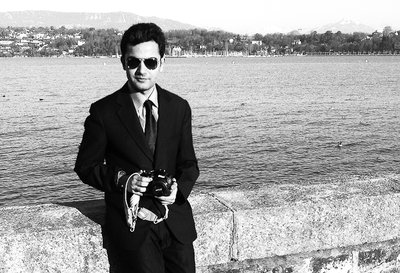24 Jun 2014
MILE Alumni Profiles: Arpit Bhutani
"Practitioners and lecturers from all over the world flew into Bern to teach us on a variety of topics, making the MILE quite unique in comparison to other master programmes."
MILE 12 graduate Arpit Bhutani has been involved with the United Nations Forum on Sustainability Standards (UNFSS) since its conception and now serves as an UNFSS observer in India. He is passionate about protecting the environment, and believes the time to act is now.
Tell us about your work in the area of sustainability standards. I am working with the United Nations Forum on Sustainability Standards (UNFSS) as an Observer in India. The UNFSS is a joint initiative of five UN agencies i.e. Food and Agriculture Organization (FAO), International Trade Centre (ITC), United Nations Conference on Trade and Development (UNCTAD), United Nations Environment Programme (UNEP) and United Nations Industrial Development Organization. The UNFSS is an unbiased and credible policy forum that benefits from the analytical, empirical and capacity building activities of participating UN agencies. Such collaboration achieves a better understanding of the impacts of Voluntary Sustainable Standards (VSS) on developing countries in an efficient, consistent, inclusive and demand driven manner. Furthermore, I work as Sustainability and Production Manager for my family business. Environmental issues seem very close to your heart. When did that interest begin? Yes indeed. Environmental issues have always been very close to my heart and this interest began during the early years of law school. Environmental studies coupled with Public International Law and Trade law paved the way for further interest in the field of International Environmental Law and its relationship to trade. Growing up in a developing country, I have experienced air pollution and observed the way our natural resources have been exploited. I truly believe that we do not have any time to waste on regrets or blame games. The time to act is now. Some of my classmates at the WTI might recall that I stood up in class to say developing countries should be on the same level playing field as the west in climate change mitigation and said, “I am a climate change guy”. Apparently everybody was laughing but I was very serious about it. What led you to Bern, and the WTI, after completing your law degree? During law school I wrote my dissertation on International Trade in Domestically Prohibited Goods and Hazardous Substances. I was advised by my seniors at Seth Dua and Associates (a Delhi-based law firm) to apply for the MILE at the World Trade Institute in Bern if I wanted to be ‘a MILE ahead’. I hadn’t heard of the WTI before and was in fact planning to do my LLM in England but I made the right choice in the end and I’m very happy I decided for Bern and the WTI. How do you look back on your time in Bern? To be honest, while I was living in Bern I never appreciated it as much as I should have. I was too busy writing exams and visiting the surrounding countries during the breaks. It was only in the final few weeks of the programme that I realised I was living in one of the most beautiful cities in the world! Since then, whenever I return, I take the time to enjoy the city. This was also a valuable lesson for me that it’s better to enjoy where you are rather than where you could be. I guess I could say that it was the best time of my life, from intensive study to running for the train every morning (almost always at the last minute), walks in the old town, barbecue on the Gurten, Erasmus Parties every Thursday, cooking chicken curry for friends, living in the student house Fellergut, the MILE ski trip, Bern carnival, sun basking on Grosse Schanze university lawns and foremost making lifelong friends. Everything was just perfect and soon it was time for us to leave the city. But the memories remain and will always remain. Bern is a unique Unesco heritage city, in a way so modern but on the other hand still a small village. What did you particularly value about the MILE programme? The interdisciplinary approach to the curriculum is the best part of the MILE programme. Practitioners and lecturers from all over the world flew into Bern to teach us on a variety of topics, making the MILE quite unique in comparison to other master programmes. Another important aspect is the wide curriculum. To be successful in this competitive world, or at least to enter and take the first step, we need to be a ‘Jack of more than all trades’. In retrospect, our weekly exams taught us how to work hard to deadlines and to work in groups. Another positive impact on the students is that the WTI administration is closely connected to the industry i.e. many faculty members were actually highly successful practising negotiators, trade experts, lawyers and economists. I remember Professor Sauvé advising on the first day of the MILE programme, “your professors are your first contact with the industry, make sure you talk to them, keep in touch with them and don’t be shy”. I followed that advice and got my job. The moot court and thesis were other milestones of the programme. For the moot court we were expected to work in teams, which was sometimes challenging. The valuable lesson I learned from the experience was to listen to other people and really understand the difficulties, problems and benefit of working in a group. With regard to the thesis I was grateful that Professor Lorand Bartels agreed to supervise and that upon Professor’s Sauvé’s insistence, I was able to carry out part of my thesis research at Trinity Hall, University of Cambridge. I remember that my first few days of the MILE programme were very difficult and I was missing home. I am really thankful for the support of
Prof. Sauvé,
Prof. Cottier,
Dr. Shingal,
Jin Glover,
Susan Plattner and fellow students
Mate Kander and
Ali Reza. What are your career aspirations? To work in the sector of Private Standards and strengthen the role of trade in mitigating climate change via private initiatives. I believe that sustainable development is the need of the day and we do not have any time left to pass the blame to others. I also want to work in my family business and help make it as sustainable as I can to set as a benchmark for other initiatives.



